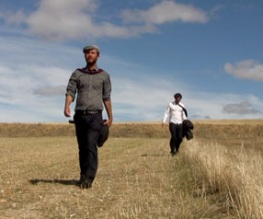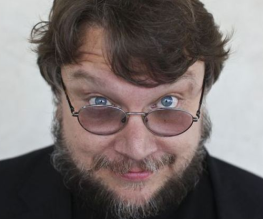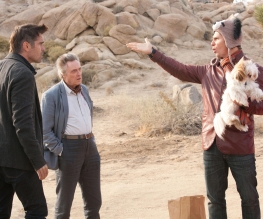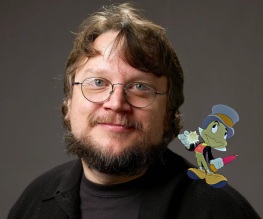The Soul of Flies

Ever since Don Quixote first set about those windmills, Spain – or more accurately the Spanish speaking world – has been the home of magical realism, the literary form which found its way into cinema with the likes of Buñuel, Erice, Almodóvar and Luna. Big Spanish shoes, basically. Does first-time director Jonathan Cenzual Burley have what it takes to follow in the footsteps of giants? And does he want to?
Asserting its magic realist leanings from the off, The Soul Of Flies (El alma de las moscas) begins with bookish chapter headings and a flurry of third person narration – classic moves. Evaristo de la Sierra (Cenzual), we learn, has in his long life been something of a cad, siring two sons by two women and abandoning both before birth. This sad situation must be rectified, he decides, and before we know it the old scoundrel has died and his sons are meeting for the first time outside a deserted train station from which they plan to travel to their long lost padre’s funeral. Up-beat pragmatist Nero (Calabrese), is full of romantic expectation, while straight-faced realist Miguel (Sáez) simply wants to get to the funeral ASAP in order to ‘make sure he’s dead’.
Discovering the station is no longer in use, the brothers accept a lift from a passing taxi, unwittingly kicking off what will prove to be an increasingly eccentric odyssey through the meandering B-roads of baking rural Spain. Encountering all manner of romantic characters along the way, including a suicidal narcoleptic, a ghost (this is magic realism remember – there has to be a ghost), and the ‘girl of the sunflowers’, griddle my squid if the brothers don’t also begin to bond and, you know, learn stuff – stuff about life, about each other, and hey, about themselves.

Not for director Burley, then, the radical politics or the eye-slicing bravura of Erice and Buñuel. The moral of his story, as spelled out in the final narration, has something to do with being alone, or maybe dying alone, and needing other people to… eh, help you make memories so that you’re not alone when you’re dying or… something. As sentiments go, this one might have been ripped right out of a Hallmark bereavement card. But it doesn’t matter by this point anyway, because in theory you’re already drunk on pure whimsy and are staggering around giggling with one leg out of your pants, and it’s really only in this respect that this otherwise likeable and – considering it’s a directorial debut made for little more than pocket money – accomplished film lets itself down. You just can’t shake the feeling that, given this is a debut, the film you’re watching should have much, much bigger balls. Bunuel, after all, had massive, impossibly sexy balls right from day one, and while it’s unfair to saddle every young Spanish filmmaker with the great balls-heavy canon of that country’s cinema… the lady of the sunflowers? Come on. Where, I ask, are The Soul Of Flies’ cojones?
Probably the correct answer is: Far, far away over the sea. With its emphasis on rootsy music, dry-as-dust humour, and fondness for long shots of men in suits, The Soul Of Flies in fact owes very little to its Spanish predecessors, and a whole lot to the relatively chilled American branch of magical realist cinema as typified by Jim Jarmusch. This is great if you’re a fan of the relatively chilled American branch of magical realist cinema as typified by Jim Jarmusch. Not one to rub its balls in your face, this school of filmmaking rather leaves you to come to its balls, principally by being so drop-dead cool you figure it must have them somewhere and they must surely be large and intense.

Achieving this level of cool, however, can be a challenge. How do you do it without, for example, Tom Waits? Dress your cast up in dark glasses and have them smoke filterless cigarettes in the sun all you like, Jonathan Cenzual Burley, but good as they are (and they are really good), they are not Tom Waits. Make them play the guitar in a pork pie hat – they are still not Tom Waits. There is no question The Soul Of Flies is cool, but without the Waits factor, is it cool enough? Is it Jarmusch cool? Let’s hope so, because if the answer is no, all we’re left with is a sad, ball-less scrotum, shrivelling up under the searing heat of the Spanish sun like so much discarded chorizo skin. And that, I think you’ll agree, is something nobody wants to see. Ever.
By Andrew Burt





Recent Comments